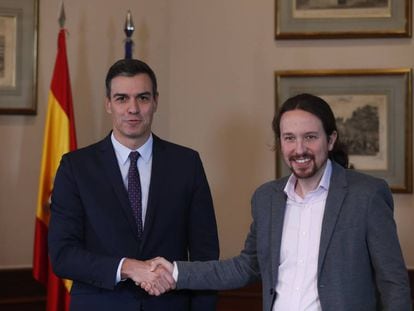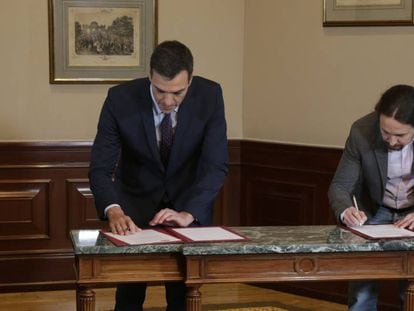Spain’s PM has a governing deal; now he needs to sell it to Congress
Pedro Sánchez may have reached a preliminary agreement with the anti-austerity Unidas Podemos, but securing support from Catalan separatist lawmakers will prove tricky
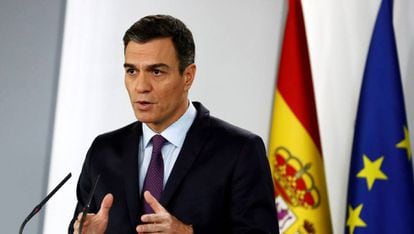
The caretaker prime minister of Spain, Pedro Sánchez of the Socialist Party (PSOE), is racing to secure his return to office after winning the repeat general election on Sunday but failing to secure a parliamentary majority.
After announcing a surprise deal with the anti-austerity Unidas Podemos for a coalition government just 48 hours after Spaniards went to the polls – earlier failure to reach such an agreement had led to the repeat vote – Sánchez is now trying to convince a Catalan separatist party to help him at the investiture vote, which could be held in the coming weeks.
Pedro Sánchez is now is talking about “a political crisis” in Catalonia
Sánchez, who now has 120 seats in Congress, three down from the April 28 election, is trying to get the Catalan Republican Left (ERC) to abstain at this parliamentary vote to endorse the new administration. Sánchez’s bid to form a government after April failed to attract enough congressional backing, and Spain has been run by a caretaker government since then.
The ERC, whose leader Oriol Junqueras was recently sentenced to 13 years in prison for sedition and misuse of public funds in connection with the 2017 secession attempt, is demanding a change in the Socialist leader’s rhetoric about Catalonia, and the creation of a committee outside of parliament in exchange for its support.
Sánchez had toughened up his Catalonia talk in the last few days of the election campaign in a bid to compete with the right for undecided voters. Shortly before the election he said he supported reintroducing criminal penalties for calling illegal referendums. But now he is talking about “a political crisis” and “a territorial crisis,” rather than “a crisis of coexistence.” The ERC had publicly asked the PSOE leader to admit that the crisis in Catalonia is political.
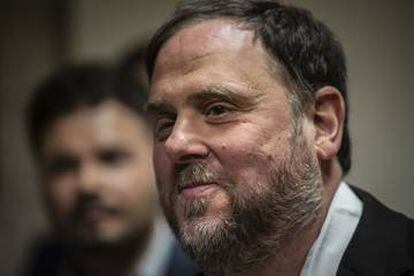
Now, Sánchez is trying to convince ERC’s 13 lawmakers in Congress that if they don’t help create a center-left government with their abstention at the investiture vote, there could be a third general election in Spain in the space of a year, one that might deliver even bigger gains to the far right, which has more than doubled its congressional presence from April. “Otherwise, what solution do you propose? What kind of government do you want?” he said.
So far, ERC leaders have said they plan to vote no, adding that they remain open to further talks.
Besides the ERC, Sánchez also needs to court several smaller regional parties, including the Basque Nationalist Party (PNV) – which just lost one seat to the conservative Popular Party (PP) in the most recent vote count – the Canaries Coalition (CC) and the Galician Nationalist Bloc (BNG). He will also need an abstention from the Basque Country party Bildu, a radical nationalist leftist group.
“Heaven is won through perseverance”
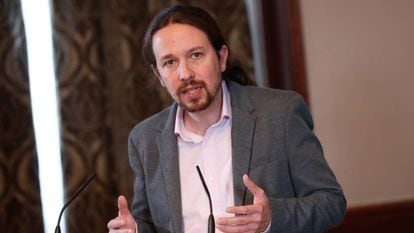
Caretaker Prime Minister Pedro Sánchez has said he is very excited about the preliminary agreement he has struck with Pablo Iglesias of Unidas Podemos, who stands to become the new deputy prime minister of Spain in a coalition government.
Until recently, Sánchez had been underscoring the tremendous difference in the way that the PSOE and Unidas Podemos viewed the Catalan crisis. The latter had defended the region’s right to decide in a referendum, while the former rejected such a vote as unconstitutional.
Iglesias, who had not made any statements since the deal was announced on Tuesday, has sent a letter to supporters warning them that their views will be in the minority in a PSOE-led executive, and that “we will have to yield on many issues.”
Besides Catalonia, both parties have diverging views on the economy. Iglesias has warned party members that Podemos will have to give up on part of its program. “Remember that heaven is won through perseverance,” he has warned.
English version by Susana Urra.
